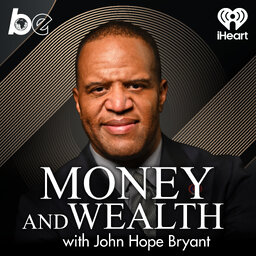How I Failed (Pt.1): Falling Forward
In the first of many "how I failed" episodes, John shares life lessons from when his business portfolio was not where it is today. Success is a progress and the only way to truly fail, is to not try at all.
In 1 playlist(s)
Money & Wealth With John Hope Bryant
John Hope Bryant- successful entrepreneur, executive and philanthropist –will dispense his trademark…Social links
Follow podcast
Recent clips

Turning No Into a Lease
12:17

Built for the Storm: How to Protect, Survive & Thrive in Uncertain Times
54:29

Speak Wealth: Learning the Language They Never Taught Us
23:50
 Money & Wealth With John Hope Bryant
Money & Wealth With John Hope Bryant